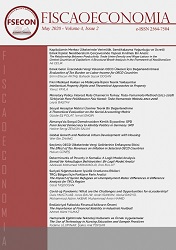Emek Geliri Üzerindeki Vergi Yükünün OECD Ülkeleri İçin Değerlendirilmesi
Evaluation of Tax Burden on Labor Income for OECD Countries
Author(s): Emin Efecan Aktaş, Bahadır Sazak DoğanSubject(s): Supranational / Global Economy, Labor relations, Fiscal Politics / Budgeting, Human Resources in Economy, Socio-Economic Research
Published by: Ahmet Arif Eren
Keywords: Labour Income; OECD; Personal Income Tax; Tax Burden; Tax Wedge; Wage;
Summary/Abstract: The tax regulated by law should be collected from taxpayers in proportion to their ability to pay as a requirement of the principle of fairness in taxation. The importance of the ability of tax payment has been increasing in terms of tax burden in recent years. The tax burden is expressed as both individual and total tax burden. The personal tax burden is calculated by the ratio of taxes paid by individuals to their personal income. Countries and organizations such as OECD calculate the tax burden in more detail and specifically. In this study, a comprehensive analysis of the change of tax burden in OECD countries for the period 2000-2018 is carried out. Before analyzing, some basic information about main concepts such as labour income, tax burden, personal income tax are given. The percentage change in the process of the tax burden for household types during that period are shared through tables which are included with the datas from OECD database and its reports, and the findings related to them are evaluated.
Journal: Fiscaoeconomia
- Issue Year: 4/2020
- Issue No: 2
- Page Range: 241-286
- Page Count: 46
- Language: Turkish

